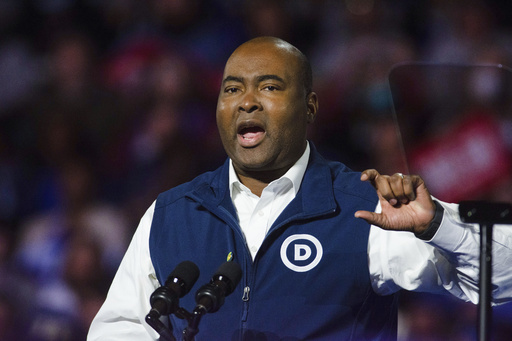
WASHINGTON — Following Donald Trump’s significant electoral success, the Democratic Party is grappling with fundamental issues regarding its future direction and leadership. One of the immediate questions is who will succeed Jaime Harrison as the chairman of the Democratic National Committee (DNC). Harrison is not anticipated to pursue a second term, which opens up the chairman position that must be filled by March 1, in accordance with party rules. The choice of a new leader will reflect not only the party’s strategy moving forward but also the perceived challenges they faced in the recent electoral cycle against Trump.
The incoming chair will be tasked with managing the party’s 2028 nomination process, a crucial and potentially contentious endeavor, making their role critical as the party prepares for the next presidential election. Harrison faced criticism for supporting President Joe Biden, despite uncertainty from many Democratic constituents about Biden’s potential reelection campaign. Following Biden’s underwhelming debate performance, some accused Harrison of trying to orchestrate a virtual roll call in anticipation of Biden potentially bowing out of the race.
Discussions about Harrison’s successor seem to align with a fundamental debate within the party: Should they prioritize choosing an experienced operative skilled in revamping the party’s infrastructure, or should they seek a communicator capable of effectively countering the Trump administration and robustly marketing Democratic ideals to a disaffected electorate?
According to Howard Dean, a former DNC chair, the party would benefit from a leader who comes from outside the Washington political bubble and understands grassroots politics. Dean has received inquiries about running again, though he has no intentions of doing so. He noted that the DNC often resembles an entity that is too insular and that the next chair should aim to make the party more inclusive of the diverse political landscape across the country.
A private meeting of leading Democrats is scheduled for mid-December in Scottsdale, Arizona, where serious contenders are expected to be discussed or even publicly revealed by that time. Following the recent electoral defeats, there seems to be a growing inclination among DNC members for a leadership figure who possesses strong ties to the party’s broader establishment while also bringing an outsider’s perspective. Additionally, there is support for the next chairperson to assume a full-time role, something that could complicate matters for any current officeholders.
Rosemary Boeglin, a representative for the committee, emphasized that the party needs to focus on unifying its base and holding the Republican Party accountable for its policies moving forward. She indicated that the committee would be outlining a process for selecting a new chair in the coming weeks.
Potential candidates gaining attention include notable figures such as Kentucky Gov. Andy Beshear, former Georgia lawmaker Stacey Abrams, New Jersey Gov. Phil Murphy, former Texas Representative Beto O’Rourke, Transportation Secretary Pete Buttigieg, and former Maryland Governor Martin O’Malley, who is currently serving as commissioner of the Social Security Administration.
Less prominent names include state party leaders like Ken Martin of Minnesota, Ben Wikler of Wisconsin, and Michael Blake, a previous DNC vice chair. Murphy and O’Malley have reportedly been engaging with DNC members and donors to gauge interest in a leadership run, though it remains uncertain if they will formally enter the race. Additionally, donors and operatives have encouraged O’Rourke to consider a candidacy.
Interestingly, Beshear, who has garnered two terms as governor in a heavily Republican state, is reportedly not interested in the chair role, along with Buttigieg, who ran for the position back in 2017. Sources close to Abrams also indicate she is not considering the role. Martin has been proactive in reaching out and polling support among state party officials after the recent electoral results.
In the aftermath of recent defeats, Wikler highlighted their successes in Wisconsin amidst a national trend favoring Trump, praising the efforts of their team in reducing expected losses. Blake expressed that the recent electoral performance calls for significant changes within the party and is weighing his decisions regarding a potential run for DNC chair or a bid for New York City mayor.
Vermont Senator Bernie Sanders, who has been vocal about the party’s need to address the concerns of working-class voters, is expected to play a considerable role in influencing the selection of the new DNC chair, albeit behind the scenes. Sanders was active in the leadership discussions following the party’s loss in 2016, previously supporting Keith Ellison’s candidacy. The latest election loss is likely to compel Democrats to critically evaluate their messaging, strategies, and core beliefs, much like the introspection triggered by previous defeats.
Many within the committee contend that the next chair should not be limited to one particular skill right now as the party looks to reclaim its footing. Instead, there is a consensus on the need for a well-rounded candidate who can handle various demands, from fundraising to modernizing the party’s approach. A seasoned Democratic operative remarked on the importance of adapting to change and representing the party’s dedication to the democratic process, asserting that the fight to reclaim influence will not fade.
